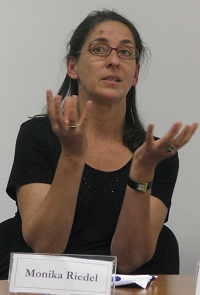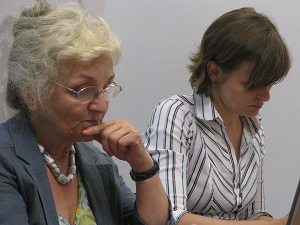CASE Policy Research Seminar: Long-term care: sectorial needs and challenges in Poland and in the EU
 Results of the FP7 EC funded project “Assessing Needs of Care in European Nations – ANCIEN” were presented at CASE Policy Research seminar. The scientific coordinator from CPB Netherlands Bureau for Economic Policy Analysis (CPB), Esther Mot presented aspects of long-term care (LTC) system performance for Poland. Monika Riedel from the Institute for Advanced Studies (IHS) gave an insight on the results of cluster analysis of long-term care systems in Europe highlighting the position of Poland. The Vice Chairwoman of CASE Supervisory Council, Prof. Stanislawa Golinowska gave a presentation on the LTC needs assessment in Poland based on demographic and health limitation determinants. The presentations were moderated by CASE expert, Anna Ruzik-Sierdzinska.
Results of the FP7 EC funded project “Assessing Needs of Care in European Nations – ANCIEN” were presented at CASE Policy Research seminar. The scientific coordinator from CPB Netherlands Bureau for Economic Policy Analysis (CPB), Esther Mot presented aspects of long-term care (LTC) system performance for Poland. Monika Riedel from the Institute for Advanced Studies (IHS) gave an insight on the results of cluster analysis of long-term care systems in Europe highlighting the position of Poland. The Vice Chairwoman of CASE Supervisory Council, Prof. Stanislawa Golinowska gave a presentation on the LTC needs assessment in Poland based on demographic and health limitation determinants. The presentations were moderated by CASE expert, Anna Ruzik-Sierdzinska.
The ANCIEN project, A short overview and some results
 Esther Mot gave an overview of the FP7 project that studies LTC for the elderly in Europe. The objectives of this project are to describe and characterize the diverse European LTC systems. ANCIEN aims at analyzing the need for care and the efforts to improve the quality of LTC. Mot provided a cross-country comparison of LTC use in Poland and three other representative countries based on care use and financing. First results show that informal care in Poland is a necessity (11.7 percent of relevant elderly population used personal care from outside the household in 2006/2007). Furthermore, 5.6 % of the population above 65 years in the Netherlands uses residential care, whereas in Poland, only 1.1 % takes advantage of such a solution. Mot concluded that demography and systems have a high impact on care use: if Poland adopted the Spanish care use pattern, the residential care use would be higher (5.8 % in 2040) than keeping its own care use (1,3 %). While comparing the quality of life, it was estimated that the probability of receiving help is much lower in Poland than in the other examined countries; the probability of help meeting needs all the time is the lowest in Poland and Spain;
Esther Mot gave an overview of the FP7 project that studies LTC for the elderly in Europe. The objectives of this project are to describe and characterize the diverse European LTC systems. ANCIEN aims at analyzing the need for care and the efforts to improve the quality of LTC. Mot provided a cross-country comparison of LTC use in Poland and three other representative countries based on care use and financing. First results show that informal care in Poland is a necessity (11.7 percent of relevant elderly population used personal care from outside the household in 2006/2007). Furthermore, 5.6 % of the population above 65 years in the Netherlands uses residential care, whereas in Poland, only 1.1 % takes advantage of such a solution. Mot concluded that demography and systems have a high impact on care use: if Poland adopted the Spanish care use pattern, the residential care use would be higher (5.8 % in 2040) than keeping its own care use (1,3 %). While comparing the quality of life, it was estimated that the probability of receiving help is much lower in Poland than in the other examined countries; the probability of help meeting needs all the time is the lowest in Poland and Spain;  but Poland scores well right after France on unobserved properties of the LTC system.
but Poland scores well right after France on unobserved properties of the LTC system.
Long-term care systems in European countries – results of cluster analysis
Monika Riedel from the Institute for Advanced Studies (IHS) summarized the results of Work Package 1 of the ANCIEN project, which involved the derivation of a typology of long-term systems in Europe. Riedel discussed the derived typology highlighting the position of Poland. The presentation was focused on portraying the long-term care systems in the light of providing care and financing.
Health status and disability of Polish population. Factors for assessment of LTC needs
 Prof. Stanislawa Golinowska and CASE expert, Agnieszka Sowa, highlighted in their presentation the fact that Poland belongs to the group of countries with a high level of disability; the health status of the Polish population is not very high compared to the EU average one. Together with dynamic ageing the high disability level creates serious health and mobility problems for the elderly. This, as well as the fact that care is provided mainly informally, the organization of a coherent LTC system still represents a challenge.
Prof. Stanislawa Golinowska and CASE expert, Agnieszka Sowa, highlighted in their presentation the fact that Poland belongs to the group of countries with a high level of disability; the health status of the Polish population is not very high compared to the EU average one. Together with dynamic ageing the high disability level creates serious health and mobility problems for the elderly. This, as well as the fact that care is provided mainly informally, the organization of a coherent LTC system still represents a challenge.
Presentations are available on CASE vimeo channel.
Esther Mot: The ANCIEN project, A short overview and some results from CASE on Vimeo.
Monika Riedel: Long-term care systems in European countries – results of cluster analysis from CASE on Vimeo.
Stanislawa Golinowska - Health status and disability of Polish population. Factors for assessment of LTC needs from CASE on Vimeo.

